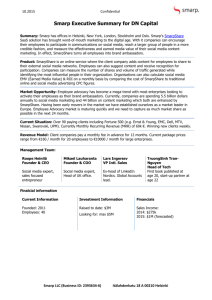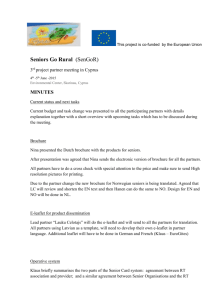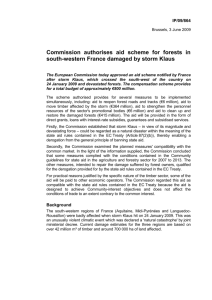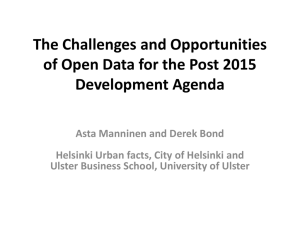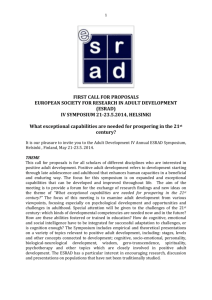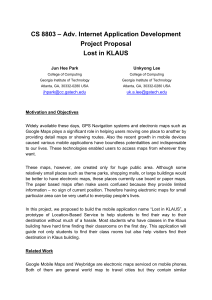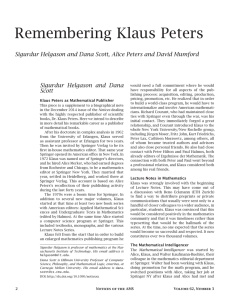Presentation
advertisement
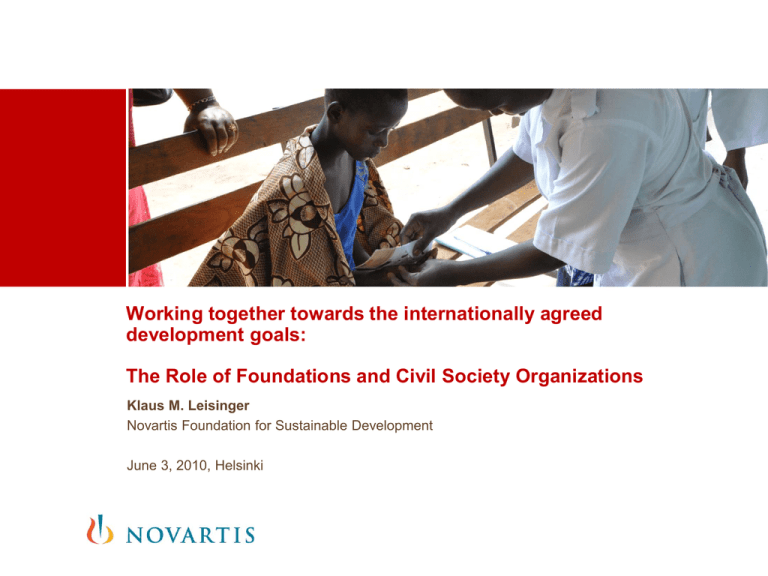
Working together towards the internationally agreed development goals: The Role of Foundations and Civil Society Organizations Klaus M. Leisinger Novartis Foundation for Sustainable Development June 3, 2010, Helsinki An Inconvenient Truth: Persistent unacceptable inequity in life expectancy This Japanese girl is likely to live 86 years This girl from Sierra Leone is likely to live only 36 years 2 |Helsinki Symposium Input | Klaus M. Leisinger | June 3, 2010 | Business Use Only Poverty and health: a vicious circle Individual and collective poverty Save drinking water and good personal and food hygiene Basic education for health awareness and appropriate health seeking behavior State of health Good governance incl. appropriate allocation and funds for health and good health policy Sufficient health infrastructure for preventive and curative care Appropriate habitat incl. good sanitation Save and adequate food Freedom from discrimination, violence and harmful traditional practices Life style choices and risk taking (e.g. food) habits, sexual behavior, smoking 3 |Helsinki Symposium Input | Klaus M. Leisinger | June 3, 2010 | Business Use Only Access to diagnosis and medical care (treatment and prevention) Source: Novartis Foundation for Sustainable Development Determinants of access to treatment: A multicausal affair Affordability (individual and collective poverty) Allocation of funds for health interventions (incl. drugs) Effective diagnosis and acceptance by patient Acceptability (cultural „mindset“, health seeking behavior, quality of care) Access to treatment Availability (supply and quality of health management) Rational use of drugs and patients‘ compliance Accessability (cultural, geographical, logistical) Source: Novartis Foundation for Sustainable Development 4 |Helsinki Symposium Input | Klaus M. Leisinger | June 3, 2010 | Business Use Only Complex issues necessitate „multi-stakeholder-solution teams“ Sustainable solutions of complex problems necessitate a variety of different resources, different skills, different experiences, different methodologies and different mind-sets – but one coherent approach; There are problems the “market” can solve and there are those markets fail to solve; Actors with a government background, a NGO background, an international development background as well as a private sector background will bring in different ideas, skills, resources, etc. – the “right mix“ will depend on the specific circumstances; There are “win / win / win”- opportunities, i.e. making progress towards the development goals and regard the enlightened selfinterests of the partners involved; 5 |Helsinki Symposium Input | Klaus M. Leisinger | June 3, 2010 | Business Use Only Perceived or real obstacles for „multi-stakeholder-solution teams“ ... However often the „human factor“ in NGOs, UN agencies and the private sector does not favor cooperation with partners from “other silos”...: Resistance of staff members caused by underlying fears and “serious and distinct negative” (1) stereotypes about the business community; Belief that „business community cannot share the same values“ - 95% of staff qualified the UN as ethical, respectful and honest – the same traits were ascribed to business by only 10% of respondents (2); Prejudice that „Engagement with the UN is „to improve image and for PR reasons“ (2) (as if that would matter if poor people are made better off…) Emphasis on and hiding behind bureaucratic rules instead of focus on results and concrete solutions Cultivation of resentments against NGOs or “functionaries” outside the “business silo”, uncritical spread of “narratives” supporting prejudice; etc. Achievement of Millennium Development Goals necessitates systemic partnerships of all responsible actors which again need a changed mindset ECOSOC Special Event on Philanthropy and The Global Public Health Agenda - Klaus M. Leisinger |February 23,.2009 | 6| Business Use Only Sources: (1) Laufer Green Isaac (2004) Hidden Agendas: Stereotypes and Cultural Barries to Corporate-Community Partntrships; Conclusion 1: No single Actor can solve the problem Different actors with different knowledge, skills, experience, resources and networks must come to the table; Valuational and attitudinal prerequisites are • Professionalism (renunciation of us versus them attitudes, highest quality standards, etc.); • Honesty (also with regard to differences and incompatibilities as well as other difficulties); • Transparency (inclusive dilemma sharing, differences in value mind-sets, etc.); • Accountability; • Willingness to cooperate goal-oriented and accept out-of-the-box solutions; • Modesty to reach for what is possible! Amartya Sen (“not trying to achieve a perfect world but solve problems and remove clear injustices where you can.”) 7 |Helsinki Symposium Input | Klaus M. Leisinger | June 3, 2010 | Business Use Only Conclusion 2: Sustainable development needs “collective action” Future successes depend on robust collective action of the international community, national governments, Civil Society, academia and the private sector; Let us look for and create incentives for cooperation and coherent action; Let us support all aims, objectives and targets of members of the “development stakeholder team” in good faith and create as much synergy as possible; Let us celebrate success where we achieve it together; Let this meeting be the start of a development dialogue towards globally accepted principles and values for good practices of comprehensive and inclusive development endeavours. . 8 |Helsinki Symposium Input | Klaus M. Leisinger | June 3, 2010 | Business Use Only

